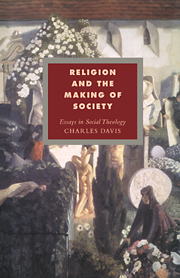Book contents
- Frontmatter
- Contents
- General editors' preface
- Acknowledgements
- Introduction: from the secular to the supernatural
- PART I Society, religion and human agency
- PART II Praxis, narrative and religious language
- 5 Theology and praxis
- 6 Revelation, historical continuity and the rationality of tradition
- 7 The political use and misuse of religious language
- PART III From the modern subject to the postmodern self
- PART IV The option for the future
- Index
- Cambridge Studies In Ideology And Religion
6 - Revelation, historical continuity and the rationality of tradition
Published online by Cambridge University Press: 18 December 2009
- Frontmatter
- Contents
- General editors' preface
- Acknowledgements
- Introduction: from the secular to the supernatural
- PART I Society, religion and human agency
- PART II Praxis, narrative and religious language
- 5 Theology and praxis
- 6 Revelation, historical continuity and the rationality of tradition
- 7 The political use and misuse of religious language
- PART III From the modern subject to the postmodern self
- PART IV The option for the future
- Index
- Cambridge Studies In Ideology And Religion
Summary
The purpose of this chapter is to bring the problematic of revelation into relationship with the problematic of critical theory. Revelation is considered as a distinguishing feature of the Western religions, namely Judaism, Christianity and Islam, all of Semitic or Near Eastern origin, in contrast to the Eastern or Asian religions. That means that revelation is linked to belief in a personal God. The God who reveals and is revealed is conceived as a personal agent who acts and who speaks. Revelation is, therefore, understood as a communication from a personal God to human persons as persons, that is, as beings capable of an intelligent and free response to a divine communication.
It is useful here to apply the distinction made by Gilbert Ryle between achievement verbs and task verbs. Achievement verbs express success in attaining some goal; task verbs express the activities or process required to reach that goal. ‘The athlete won the race’ – ‘win’ is an achievement verb; ‘The athlete ran the race’ – ‘run’ is a task verb. We do not observe the distinction rigidly, often borrowing achievement verbs to express the process leading to the achievement. For example, we speak of a runner winning a race while still running. But it makes for clarity to be aware of the difference in logical behaviour between the two classes of verb. ‘Reveal’ is best understood as an achievement verb. It expresses the accomplishment of a communication between God and the recipient of the revelation. It affirms the completion of a communication, while allowing that the processes leading to the achieved communication may be many and various. These processes will be expressed by a variety of task verbs.
- Type
- Chapter
- Information
- Religion and the Making of SocietyEssays in Social Theology, pp. 96 - 111Publisher: Cambridge University PressPrint publication year: 1993



